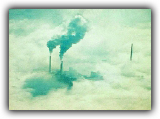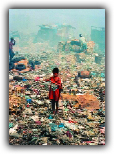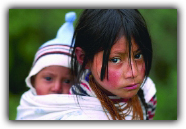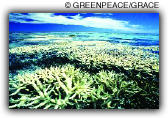 |
|
|
|
|
| |
POLLUTION
The Torrey Canyon oil tanker runs aground and spills 117,000 tons of oil into the North Sea near Cornwall in the United Kingdom. The massive local pollution helps prompt legal changes to make ship owners liable for all spills.

|
|
GOVERNANCE
Experts from around the world meet for the first time at the UN Biosphere Conference in Paris, France, to discuss global environmental problems, including pollution, resource loss, and wetlands destruction.

|
|
|
GOVERNANCE
Millions of people gather in the United States for the first Earth Day to protest environmental abuses, sparking the creation of landmark environmental laws including the Endangered Species Act and the Safe Drinking Water Act.

|
|
|
POLLUTION
Researchers report that three-quarters of the acid rain falling in Sweden is caused by pollution originating in other countries.

|
 |
GOVERNANCE
Economist Barbara Ward and microbiologist Rene Dubos publish Only One Earth, which warns that human actions are undermining the Earth's ability to support us.

|
|
 |
BIODIVERSITY
The Convention on International Trade in Endangered Species of Wild Fauna and Flora (CITES), which eventually restricts trade in roughly 5,000 animal species and 25,000 plant species threatened with extinction, is adopted. While the treaty has a broad mandate, inadequate enforcement allows a billion dollar black market in wildlife trade to flourish.

|
POLLUTION
The Convention for the Prevention of Pollution from Ships (MARPOL) is adopted to restrict the release of pollutants from ocean-going vessels. It regulates dumping and accidental spills of oil, garbage, plastics, and sewage.

|
|
OZONE LAYER
Chemists Sherwood Rowland and Mario Molina publish their landmark findings that chlorofluorocarbons (CFCs) can destroy ozone molecules and may threaten to erode the Earth's protective ozone layer.

|
 |
|
|
|
INDIGENOUS PEOPLES
Indigenous protestors in the Philippines force the World Bank to withdraw its financial backing for the construction of four large dams along the Chico River. The effort to block the projects energizes a global movement to protect rivers and resist new dam building.

|
|
|
 |
POLLUTION
The reactor core at the Three Mile Island nuclear power plant in Pennsylvania partially melts down, releasing radiation into the surrounding communities.

|
|
|
|
GOVERNANCE
The UN Environment Programme organizes the Stockholm +10 conference in Nairobi. The attendees agree to a declaration expressing "serious concern about the present state of the environment" and establish an independent commission to craft a "global agenda for change," paving the way for the release of Our Common Future in 1987.

|
ECONOMICS
Mexico, and later other developing and Eastern bloc countries, come close to defaulting on $250 billion in international loans, sparking a debt crisis. Lenders extend additional loans to these countries to prevent default in a way that sets the stage for future debt disasters.

|
|
|
TOXICS
An estimated 10,000 people are killed and many more injured when Union Carbide's pesticide plant in Bhopal, India, leaks 40 tons of methyl isocyanate gas into the air and sends a cloud of poison into the surrounding city of 1 million.

|
|
|
POLLUTION
One of the four reactors at the Soviet Union's Chernobyl nuclear power plant explodes and completely melts down. The explosion sends radioactive particles as far away as Western Europe, exposing hundreds of thousands of people to high levels of radiation.

|
|
OZONE LAYER
The Montreal Protocol on Substances that Deplete the Ozone Layer is adopted to support the phasing out of production of a number of ozone-depleting chemicals.

|
|
FORESTS
Brazilian labor and environmental leader Chico Mendes is murdered by cattle ranchers. Representing 70,000 rubber tappers, Mendes had advocated the sustainable use of Brazil's forests as extractive reserves rather than clearing them for timber and grazing. The killing brings international attention to the widespread liquidation of tropical rainforests.

|
|
 |
TOXICS
The Basel Convention, which controls movement of hazardous wastes across international borders, is adopted to prevent "toxic traders" from shipping hazardous waste from industrial to developing countries.

|
|
|
|
CLIMATE
The Convention on Climate Change sets non-binding carbon dioxide reduction goals for industrial countries (to 1990 levels by 2000). The final treaty calls for avoiding human alteration of the climate, but falls far short of expectations, largely due to lack of support from the United States.

|
GOVERNANCE
Bringing together 1,700 scientists from 69 countries, the Union of Concerned Scientists issues its World Scientists' Warning to Humanity, which states that "human beings and the natural world are on a collision course."

|
|
|
 |
POPULATION
Delegates from 183 countries meet at the Conference on Population and Development in Cairo, Egypt, and set up a decades-long plan to stabilize and reduce population growth. The plan emphasizes the importance of women's education and access to reproductive health care.

|
|
POPULATION
Representatives from 180 countries meet at the Conference on Women in Beijing, China, to draft an agenda to improve the lives of women and girls. The resolution includes calls for taking action to reduce soil erosion, deforestation, and other forms of environmental degradation that often leave women and their families impoverished.

|
CLIMATE
The Intergovernmental Panel on Climate Change (IPCC), a group of hundreds of prominent climate scientists assembled by the UN in 1988, releases a report concluding that "the balance of evidence suggests that there is a discernible human influence on global climate.

|
|
TOXICS
Theo Colborn, Dianne Dumanoski, and Pete Myers publish Our Stolen Future, which warns of reproductive threats to animals—including humans—due to the release of billions of pounds of synthetic chemicals into the environment, many of which mimic and disrupt natural hormones.

|
|
CLIMATE
The Kyoto Protocol strengthens the 1992 Climate Change Convention by mandating that industrial countries cut their carbon dioxide emissions by 6 to 8 percent from 1990 levels by 2008-2012. But the protocol's controversial emissions-trading scheme, as well as debates over the role of developing countries, cloud its future.

|
|
OZONE LAYER
The ozone hole over Antarctica grows to 25 million square kilometers. (The previous record, set in 1993, was 3 million square kilometers.)

|
|
|
 |
BIODIVERSITY
The UN Biosafety Protocol implements a more precautionary approach to trading genetically altered crops and organisms, and requires exporters to receive prior consent from destination countries before shipping genetically altered crops.

|
|
CLIMATE
The IPCC releases a report citing "new and stronger evidence that most of the observed warming of the last 50 years is attributable to human activities." The study projects that at current rates, temperatures will increase by 1.4 to 5.8 degrees Celsius by 2100.

|
BIOTECHNOLOGY
The $3 billion Human Genome Project reports that the human gene count is only about 30,000—about the same as that of a weed or a mouse—not 100,000 as expected. The finding adds to the concerns about the wisdom of genetic manipulation, including inserting genes into food crops and re-engineering animals or humans.

|
 |
FORESTS
UN reports that tropical countries lose more than 15 million hectares of forests a year to agriculture, logging, and other threats.

|
 |
BIODIVERSITY
116 countries vote for a new International Treaty on Plant Genetic Resources, which gives farmers the right to save, trade, and sell seeds and limits biotech patents on plant genes.

|
WATER
UN warns that the world’s reservoirs are losing storage capacity as deforestation causes erosion and sedimentation behind dams.

|
|
BIODIVERSITY
Study says half of North America’s most biodiverse regions are degraded, and 235 mammal, reptile, bird, and amphibian species are now threatened.

|
|
ENERGY
Germany sets a goal of meeting at least a quarter of its domestic electricity needs with wind power by 2025.

|
DESERTIFICATION
Schools in Seoul, South Korea, are closed as a huge dust cloud blows in from China’s fast-spreading deserts, some 1,200 kilometers away.

|
|
BIODIVERSITY
Study says habitat conversion to agriculture and other uses costs the planet roughly $250 billion each year.

|
POLLUTION
UN warns that a 3-kilometer-deep smog layer stretching across South Asia is modifying weather patterns, damaging agriculture, and endangering health.

|
|
BIOTECHNOLOGY
Report says the global acreage of genetically modified crops increased by 12 percent worldwide, reaching 58.7 million hectares.

|
HUMAN RIGHTS
UN reports that 30 million women and children throughout Asia and Pacific have been trafficked over the past 30 years in “largest slave trade in history.”

|
FISHERIES
Scientists report industrial fishing has killed off 90 percent of the world’s biggest and most economically important fish species.

|
|
HEALTH
WHO’s 192 members unanimously adopt the first public health treaty designed to reduce tobacco-related deaths and disease.

|
FORESTS
Report says Amazon deforestation increased 40 percent compared with 2001, and Brazil registers second-highest figure in 15 years.

|
CLIMATE
Europe adopts first climate emissions trading law, giving carbon dioxide a market value across the EU when trading begins in 2005.

|
GOVERNANCE
WTO meeting in Cancun, Mexico, collapses in disputes over trade barriers and farm subsidies, as a coalition of developing nations shifts the power balance in negotiations.

|
|
 |
BIODIVERSITY
Study reports that within the past decade, war, hunting, mining, and other human pressures have wiped out 70 percent of the global population of eastern lowland gorillas—leaving fewer than 5,000 worldwide.

|
|
|
|
|

TOXICS
Marine biologist Rachel Carson publishes Silent Spring, calling attention to the threat of toxic chemicals to people and the environment.
|
 |
|
|
|
|
|
|

POPULATION
Paul Ehrlich publishes The Population Bomb, describing the ecological threats of a rapidly growing human population.
|
 |
|
|
|

GOVERNANCE
2,200 scientists, gathered for a conference in Menton, France, present a message to the UN stressing the need for collective international action in finding solutions to the "problems of pollution, hunger, overpopulation, and war."
|
|

CONSUMPTION
The Club of Rome, a group of economists, scientists, and business leaders from 25 countries, publishes The Limits to Growth, which predicts that the Earth's limits will be reached in 100 years at current rates of population growth, resource depletion, and pollution generation.
|

GOVERNANCE
Participants from 114 countries come to Stockholm, Sweden, for the UN Conference on the Human Environment. Only one is an environment minister, as most countries do not yet have environmental agencies. The delegates adopt 109 recommendations for government action and push for the creation of the UN Environment Programme.
|
|

INDIGENOUS PEOPLES
Women living in Himalayan villages in Northern India begin the Chipko movement to protect trees from commercial logging, which has begun to cause severe deforestation, soil erosion, and flooding in the region.
|

ENERGY
Arab country members of the Organization of Petroleum Exporting Countries (OPEC) reduce oil exports to Europe and initiate an oil embargo against the United States for its support of Israel in a war with Egypt and Syria.
|
|


Environmentalist Lester Brown founds the Worldwatch Institute, an
independent research organization that works for an environmentally
sustainable and socially just society.
|
|
|

URBANIZATION
Participants at the UN Conference on Human Settlements in Vancouver, British Columbia, Canada, agree that adequate shelter is a basic human right and draw up 65 recommendations for countries about how best to provide it.
|
|
|
|

POLLUTION
The Convention on Long-Range Transboundary Air Pollution, which helps combat acid rain and regulate pollution traveling across national borders, is adopted. Later protocols regulate emissions of nitrogen oxides, sulfur, heavy metals, persistent organic pollutants, and several other pollutants.
|
 |
|
|

HEALTH
The AIDS virus is detected in clinical studies. Within the following two decades, the virus rapidly spreads throughout the world, killing millions of people and undermining development efforts in many countries.
|
|

OCEANS
The UN Convention on the Law of the Sea sets a comprehensive framework for ocean use and outlines provisions on ocean conservation, pollution prevention, and protecting and restoring species populations.
|
 |
|

CLIMATE
The U.S. Environmental Protection Agency and the U.S. National Academy of Sciences release reports concluding that the build-up of carbon dioxide and other "greenhouse gases" in the Earth's atmosphere will likely lead to global warming.
|
|
|

OZONE LAYER
Scientists report the discovery of a "hole" in the Earth's ozone layer, as data from a British Antarctic Survey show that January ozone levels dropped 10 percent below those of the previous year.
|
|
|

GOVERNANCE
The World Commission on Environment and Development publishes Our Common Future (The Brundtland Report), which concludes that preserving the environment, addressing global inequities, and fighting poverty could fuel—not hinder—economic growth by promoting sustainable development.
|
|
 |

BIODIVERSITY
Biologist E.O. Wilson publishes Biodiversity, a collection of reports from the National Forum on Biodiversity in the United States. The book details how humans are rapidly undermining the Earth's ability to support its diversity of species.
|
|

POLLUTION
The Exxon Valdez tanker runs onto a reef in Alaska's Prince William Sound, dumping 76,000 tons of crude oil. The spill, the largest ever in the United States, covers more than 5,100 kilometers of pristine coastline with oil and kills more than 250,000 birds.
|
 |
|
|

SECURITY
The Iraqi army, retreating from its occupation of Kuwait, destroys tankers, oil terminals, and oil wells, setting many on fire. The fighting and sabotage leak approximately 1.25 million tons of oil, the worst oil spill in history.
|
|

BIODIVERSITY
The Convention on Biological Diversity mandates that countries formulate strategies to protect biodiversity and that industrial countries help implement these strategies in developing countries.
|

GOVERNANCE
Most countries and 117 heads of state participate in the groundbreaking UN Conference on Environment and Development (Earth Summit), in Rio de Janeiro, Brazil. Participants adopt Agenda 21, a voluminous blueprint for sustainable development that calls for improving the quality of life on Earth.
|
|
|

ENDANGERED SPECIES
The World Conservation Union (IUCN) publishes a revised Red List of endangered and threatened species, creating a world standard for gauging threats to biodiversity. Later versions report that one in four mammal species and one in eight bird species faces a high risk of extinction in the near future.
|
 |
|
 |

INDIGENOUS PEOPLES
Writer and activist Ken Saro-Wiwa is hanged in Nigeria for leading the Ogoni people's protests against environmental destruction of their lands by Royal Dutch/Shell, Chevron, and other international oil companies.
|
|
|

FORESTS
Forest fires around the world burn more than 5 million hectares of forests and other land. More tropical forests are burned in 1997 than in any other year in recorded history.
|
 |
|
|

GOVERNANCE
Massive civil society protests in Seattle help shut down international trade negotiations and spotlight the environmental and social shortcomings of the World Trade Organization.
|
|

TOXICS
The Treaty on Persistent Organic Pollutants (POPs) requires the complete phaseout of nine persistent, highly toxic pesticides and limits the use of several other chemicals, including dioxins, furans, and PCBs.
|
 |
|

CLIMATE
U.S. President George W. Bush announces that the United States will not ratify the Kyoto Protocol, saying that the country cannot afford to reduce carbon dioxide emissions.
|

HEALTH
Study links nearly 2,000 cases of thyroid cancer to the 1986 Chernobyl nuclear accident—the largest group of human cancers associated with a known cause and date.
|

GOVERNANCE
Trade ministers from 142 countries meeting in Doha, Qatar, agree to a new round of world trade talks that will set the stage for trade regulations in the new century.
|

BIODIVERSITY
Study estimates that 38 million animals are smuggled from Brazil’s forests each year for sale on the black market.
|
 |

BIODIVERSITY
Scientists warn that native maize in Mexico has suffered genetic pollution through contact with US bioengineered corn.
|

FISHERIES
Pathbreaking UN Agreement for the Conservation and Management of Straddling and Highly Migratory Fish Stocks enters into force, laying the ground rules for fisheries in international waters.
|
|

TOXICS
Report says up to 80 percent of U.S. computers and electronics collected for recycling is sent to Asia, where it threatens worker health and the environment.
|
 |

CLIMATE
Some 3,250 square kilometers of Antarctica’s Larsen B ice shelf collapse as regional temperatures warm.
|

CORAL REEFS
Survey finds that bleaching at Australia’s Great Barrier Reef in 2002 may be the worst on record, affecting up to 60 percent of reefs.
|
 |

CLIMATE
European Union ratifies the Kyoto Protocol, bringing industrial countries closer to binding reductions of greenhouse gas emissions.
|

GOVERNANCE
104 world leaders and thousands of delegates meeting at the World Summit on Sustainable Development in Johannesburg, South Africa, agree on a limited plan to reduce poverty and protect the environment.
|

POLLUTION
Oil tanker Prestige carrying 77,000 tons of oil splits apart, contaminating Spain’s Galicia coastline and unleashing public anger worldwide.
|
|
 |

HEALTH
Report says the death toll from malaria remains “outrageously
high,” with more than 3,000 African children dying daily.
|

ENERGY
Gates at Three Gorges Dam are shut and China's Yangtze River starts filling the reservoir--flooding towns, farmlands, and archaeological sites, and forcing the relocation of nearly 2 million people.
|

FOOD
Relief agencies report AIDS is fueling famine in southern Africa, where 7 million farmers have died from the epidemic.
|

MINING
15 of the world’s largest mining and metal-producing companies pledge not to explore or mine in existing World Heritage sites.
|
|

CLIMATE
Scientists report Earth’s northern hemisphere has been hotter since 1980 than at any time during the past 2,000 years.
|
 |

ECOSYSTEMS
UN report says number of the world’s protected areas has passed 100,000, covering a land surface bigger than India and China combined.
|
|

POLLUTION
The European Union issues its first-ever pollution register—containing a wealth of data on industrial emissions and representing a “landmark event” in public provision of environmental information.
|

CLIMATE
More than 2,000 people are killed during a week of torrential rains and flooding in Haiti and the Dominican Republic. Environmentalists blame hillside deforestation for massive landslides that bury crops, animals, homes, and people.
|
|